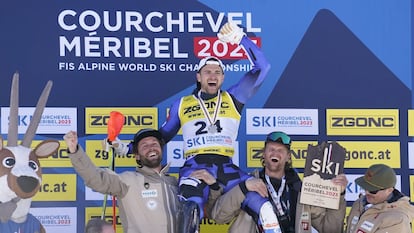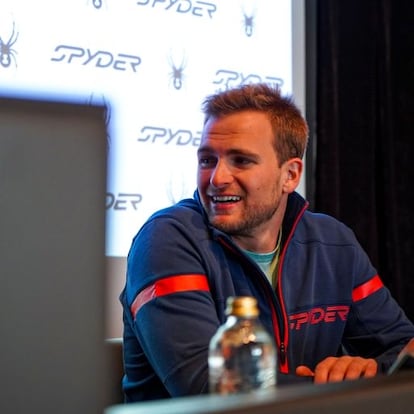Alexandros Ginnis: ‘Coming second in Chamonix was crazy, but the World Championship is an extra level of pressure’
The Athens-born skier decided to leave the US national team and represent Greece and this season he has been a revelation on the circuit, taking slalom silver in Courchevel for his birth nation’s first-ever winter sports medal

At the turn of the century, the late Spanish mountaineer Iñaki Ochoa de Olza arrived in the alpine town of Arêches-Beaufort, France, to take part in the Pierra Menta, the most important ski mountaineering race on the calendar. Dawn had just broken and he was trying to warm up in his thin lycra overalls, when an Italian competitor approached him and asked him where he was from. “Pamplona? That’s near the sea, isn’t it?” the Italian asked. “An hour’s drive away,” replied Iñaki. The Italian paused thoughtfully for a moment, then inquired: “Why didn’t you take up surfing then?” Alexandros Ginnis, 28, was born in Athens but began his sporting career representing the United States, as he has dual nationality. However, in 2020 he left the all-powerful American team and switched his allegiance to Greece. Like Ochoa de Olza, Ginnis has lost count of the number of times he has been asked why someone of Mediterranean heritage has spent years determined to find success in the world of alpine skiing, a traditional preserve of Americans, French, Austrians, Italians and Norwegians. Now, Ginnis has emerged as the unexpected revelation of the current skiing season, which will come to a close this weekend in Andorra where the finals of the 2023 Alpine Skiing World Cup will be held.
Ginnis’ rise has been a source of surprise and rejoicing on the circuit, as his success among the elite has come in an almost artisanal manner. After placing second in the Chamonix World Cup race on February 4, he claimed a slalom silver medal at the Courchevel World Championships two weeks later: the first Greek medal in the history of winter sports at World or Olympic level. Few expected such a performance from an athlete who has undergone six knee operations (four on the anterior cruciate ligament and two on the meniscus, all but one in his left knee) and who had left the powerful structure of the U.S. national team three years ago because, aside from cutting its financial support, Ginnis admitted “things there did not go well for me.”
The Hellenic Winter Sports Federation welcomed him with open arms, while also announcing in passing that they had no money to offer him either. Ginnis had been close to quitting competition but he always believed he could give a little more of himself as long as his knees held out. NBC hired him as a commentator for the 2022 Winter Olympics in Beijing. He was on the verge of becoming a former skier, but upon his return he felt he wasn’t finished, or ready yet to be content watching skiing on TV.
Η εξαιρετική 2η κατάβαση του Αλέξανδρου Γκινή που του έδωσε το ιστορικό ασημένιο μετάλλιο στο Παγκόσμιο Κύπελλο του Σαμονί στο σλάλομ#ΤeamHellas 🇬🇷#ski pic.twitter.com/FXpzwKqRy8
— Ηellenic Olympic Committee (@HellenicOlympic) February 4, 2023
“My father was a ski instructor in Greece and while teaching my mother they fell in love and got married. Skiing has always been part of our family life: on weekends, when I was very young, we skied in Greece, in the resort of Arachova near Mount Parnassos, and when we could afford it, we would travel to ski in the Alps. When I was 12, we moved to Austria during winter for my father to work in the local resorts, and I started competing there. At first I sucked at it, because even though I skied well I had never raced. But I fell in love with racing,” he laughs during a telephone conversation with EL PAÍS.
When he turned 15, the whole family moved to the United States. His dual citizenship allowed Ginnis to study in the US and, in 2012, he joined the national team. In 2015, he won a bronze medal in the slalom event at the World Junior Championships in Hafjel, Norway. Everything seemed to be moving in the right direction, except his knees, which kept snapping. “I suffered my first serious injury at the age of 17, and many others followed... At the beginning I was very young and made a lot of mistakes: I didn’t listen to advice. Now I take it as a team game between my body, my doctors, and my physiotherapists. I understand that they want the best for me and if something is not going well, I have to say so and look at other options. Now that I’ve learned to listen to them, everything works out,” he says.
Ginnis is the talk of the circuit this season and he has achieved success he began to dream of last November, when two things became apparent: that his knees were holding up and that he was skiing faster than ever before. “Coming in second place in Chamonix was crazy, but the World Championship is an extra level of pressure. I remember when I crossed the line, I looked at the scoreboard and saw that I was 12th. I said to myself that I hadn’t pushed hard enough and hadn’t made it. But I was wrong: it wasn’t 12th, but second, silver medal!”

Even so, Ginnis is still struggling to raise the necessary financial support to stay on the circuit. “Skiing is an extremely expensive sport, as we all know. All the money that comes in comes from my sponsors, and it’s a stress to spend it wisely. When I was on the American team, for years I had a lot of help, a great team behind me. Now I don’t have a lot of financial support, but we’ve figured out a way to get by: I travel by van with my two assistants, we stay in apartments instead of hotels, we cook in shifts... but it’s working out for sure because we love what we do and we have fun doing it.”
Team Ginnis consists of the skier, who is the athlete and fundraiser; Chamonix-born Gaby Coulet is the coach and organizer, who left a great job in Canada to help him; Sandy Vietz, who met Ginnis at a ski school in Vermont, is responsible for “everything.” “They’re my best friends,” he says. “If you look at the pictures when some famous skier wins, they and 50 other people from their team are on the podium, whereas when I won silver at the World Championship, it was just the three of us up there. It was hilarious.”
Ginnis does not consider himself to be living the dream. He is so attached to reality that he prefers to maintain some perspective: “It’s nice to see that your goals are being met, that all the work you’ve put in has paid off. In this skiing thing, with all the problems I’ve suffered with my knees, the low moments have been really low and now the success is a high, so I’m learning to live in the middle ground, without the negatives being a drama or success going to my head.” The Greek federation may not provide any money, but it doesn’t put him under pressure either, so he has two objectives in mind: to work as hard as possible and have a good time and, if everything continues to run smoothly, to have a run at a medal at the 2026 Winter Games in Italy.
Sign up for our weekly newsletter to get more English-language news coverage from EL PAÍS USA Edition
Tu suscripción se está usando en otro dispositivo
¿Quieres añadir otro usuario a tu suscripción?
Si continúas leyendo en este dispositivo, no se podrá leer en el otro.
FlechaTu suscripción se está usando en otro dispositivo y solo puedes acceder a EL PAÍS desde un dispositivo a la vez.
Si quieres compartir tu cuenta, cambia tu suscripción a la modalidad Premium, así podrás añadir otro usuario. Cada uno accederá con su propia cuenta de email, lo que os permitirá personalizar vuestra experiencia en EL PAÍS.
¿Tienes una suscripción de empresa? Accede aquí para contratar más cuentas.
En el caso de no saber quién está usando tu cuenta, te recomendamos cambiar tu contraseña aquí.
Si decides continuar compartiendo tu cuenta, este mensaje se mostrará en tu dispositivo y en el de la otra persona que está usando tu cuenta de forma indefinida, afectando a tu experiencia de lectura. Puedes consultar aquí los términos y condiciones de la suscripción digital.









































